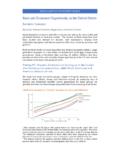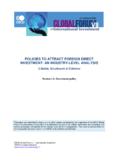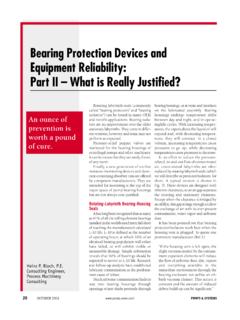Transcription of New German GAAP — The Gap Between …
1 New German GAAP The GapBetween commercial and TaxAccountingby Wolfgang Kessler and Rolf EickeReprinted fromTax Notes Int l, August 16, 2010, p. 519 Volume 59, Number 7 August 16, 2010(C) Tax Analysts 2010. All rights reserved. Tax Analysts does not claim copyright in any public domain or third party German GAAP the gap Between CommercialAnd Tax Accountingby Wolfgang Kessler and Rolf Eicke Eventually, all things merge into one;and a river runs through it. If German tax law was a river flowing over all busi-ness transactions and commercial accounting , thelast words of Norman Maclean inA River Runs ThroughItbest suit the traditional relationship Between com-mercial and tax accounting .
2 For more than 100 yearsthe principle of strict book-tax conformity (or the au-thoritative principle, orMa geblichkeitsprinzip) was themost striking feature of German tax accounting . Infact, since the enactment of the German CommercialCode (Handelsgesetzbuch, or HGB) on January 1,1900, this principle was a pillar that survived all stormsof reforms until the last reform, the accounting Mod-ernization Act (Bilanzmodernisierungsgesetz) went intoforce on May 29, , all transactions and events were firstmerged into one commercial balance, which was even-tually used by tax accounting as a starting point. Ofcourse, there were exceptions that breached the book-tax conformity, but in the end, a German taxpayer thatapplies German generally accepted accounting prin-ciples has to set up only about one and a half balances(in contrast, two separate balances must be set up inthe United States).
3 However, the regime of the hour is the internationalfinancial reporting standards. IFRS is an exhaustlesssource of debates throughout Europe and many otherparts of the world at least for big companies thatare in touch with the capital market. For obvious rea-sons, German lawmakers have refrained from basingtax accounting on these standards, leaving the compu-tation and value of the tax base in the hands of aLondon-based old boys club the InternationalAccounting Standards Board. Yet what suits commer-cial accounting might not necessarily be good for taxaccounting regarding the generation of GAAP have been facing a lot of competi-tion, even though both regimes could not be more dif-ferent.
4 Whereas IFRS is only relevant for big capital-market-focused group consolidated companies, theGerman GAAP is applicable to both single and groupconsolidated accounting . The most significant differ-ence is the perspective. IFRS focuses on investors andseeks a fair-and-true view. On the contrary, the Ger-man GAAP has for more than 100 years taken theview that each position should follow the principle ofprudence and that if in doubt, the company will be rather poor than rich, at least for accounting pur-poses. The German GAAP focuses on the creditor, notthe investor. In essence, there is a clash of the two sys-tems that served as starting point for German shifting to a more fair-and-true view was nottaken without controversy.
5 Those advocating this inter-national and modern valuation approach were criti-cized by those who blame this approach as being oneof the catalysts of the global financial the reform Germany partially uncoupled com-mercial accounting from tax accounting , giving up theauthoritative principle to some extent. In a nutshell,Wolfgang Kessler is the director of the tax department of the business and economics faculty at the Uni-versity of Freiburg and a partner with Ernst & Young in Freiburg, Germany. Rolf Eicke is an attorney-at-law with Ernst & Young in Freiburg. The viewsexpressed here are entirely their own. and NOTES INTERNATIONALAUGUST 16, 2010 519(C) Tax Analysts 2010.
6 All rights reserved. Tax Analysts does not claim copyright in any public domain or third party accounting strives to match IFRS, whereastax accounting extends those rules that diverge fromcommercial accounting and separates elections for taxaccounting purposes from those for commercial ac-counting purposes. However, the era of the authorita-tive principle is anything but over. It was the aim ofGerman lawmakers to give small and midsize compa-nies the opportunity to stick with this principle for thesake of facilitation and lower transaction ExemptionsSole proprietors are now exempt from having tokeep accounts and prepare inventory records if they donot record sales of more than 500,000 or net incomeof more than 50,000 on the reporting dates of twoconsecutive fiscal tax purposes, the ruling of section 141 AO(General Tax Code, or Abgabenordnung) remains rel-evant and is a guideline for the planned thresholds incommercial law for the keeping of accounts.
7 Sole pro-prietors who do not exceed the sales and profit thresh-olds stipulated in section 141 AO could thus restricttheir accounting to cash-based accounting section 4(3)EStG ( German Income Tax Act, or Einkommen-steuergesetz). Cash-based accounting therefore maygain importance in the to section 246(1) sentence 4 HGB, good-will acquired for a consideration in the course of abusiness combination in the form of an asset deal willin the future qualify as an asset with a limited usefullife (fiction). It is then amortized systematically overthe useful life. Corporations are required to state thereasons justifying the assumption of a useful life ofmore than five years in the notes to the financial the reform, goodwill acquired for a consid-eration had to be capitalized as an asset for tax pur-poses.
8 Variances Between the commercial and tax bal-ance sheet may result after the reform from thedifferent depreciation rulings planned. For tax pur-poses, goodwill acquired for a consideration is not am-ortized over its customary useful life as is plannedfor commercial law purposes but over a useful lifeof 15 years. If under commercial law goodwill is amor-tized over a shorter useful life than in the tax accounts,deferred tax assets will have to be taken into Tax-Allowed ReservesOptions allowed under tax law have to be exercisedin line with the commercial balance sheet. Under theold rule, tax options were only exercised as long as thecarrying amounts in the tax accounts were recognizedin the commercial balance sheet.
9 Because of the re-form, tax options that diverge from the commercialaccounting provisions may be exercised even if theyare not disclosed in the commercial balance Generated Intangible AssetsOne major change involves the internally generatedintangible assets. Because of the new ruling in section248(2) HGB, internally generated intangible assets canbe recognized. The former ban on capitalization waspartially retained because it is not possible to clearlydemarcate the production cost for the internally gener-ated intangible assets from the expenses that pertain tothe development of an entity as a whole (that is, inter-nally generated goodwill).
10 In accordance with the prin-ciple of prudence, expenses that cannot be clearly allo-cated are expensed table intends to give some insight on the mostimportant modifications due to the partial uncoupling of the commercial from thetax balance is the price for enhancing the internationalcompetitiveness of the German GAAP. Eventually, thenew German GAAP reduced the gap with IFRS, andcreated a gap regarding tax accounting . FEATURED PERSPECTIVES520 AUGUST 16, 2010 TAX NOTES INTERNATIONAL(C) Tax Analysts 2010. All rights reserved. Tax Analysts does not claim copyright in any public domain or third party Tax accounting RulesOld RuleNew RuleBookkeeping RequirementNo somesole proprietorsfrom theobligation to keep books and prepare inventory recordsand annual financial capitalize goodwill acquired for capitalize goodwill acquired for of SpecialTax-Allowed ReservesOptionalrecognition of special tax-allowed of special tax-allowed reserves(withtransitional ruling).




